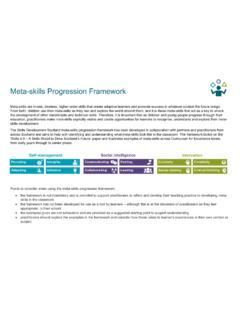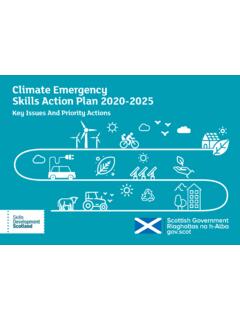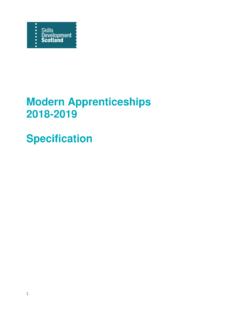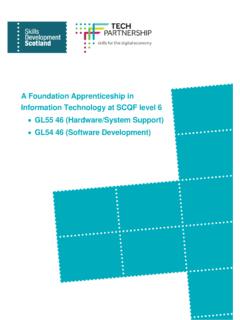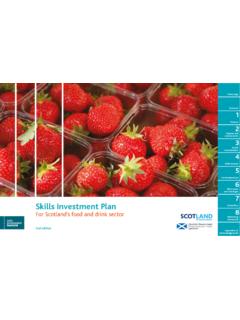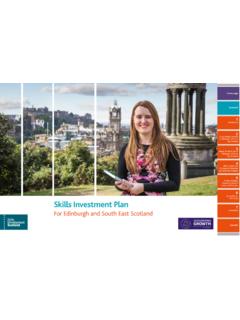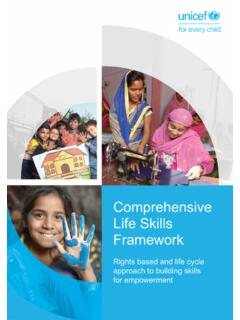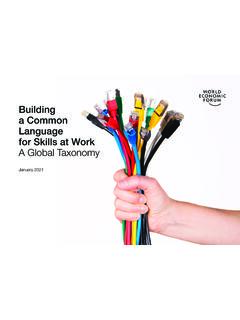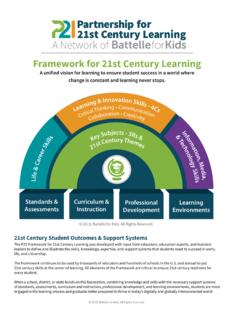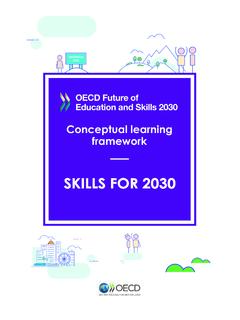Transcription of A skills model to drive Scotland’s future
1 1A skills model to driveScotland s futureSkills Development Scotland is the national skills body supporting the people and businesses of Scotland to develop and apply their Centre for Work-based Learning is a partnership between skills Development Scotland, the University of Strathclyde, Heriot-Watt University and Robert Gordon University. Its vision is to establish the value of work-based learning in the Scottish education and training system. skills Development Scotland, February 2018 This work is licensed under the Creative Commons Attribution-NonCommercial-ShareAlike International License. To view a copy of this license, visit and societal disruptions are coming at us thick and fast. Whilst we cannot predict the future , we can prepare for a future that is increasingly unpredictable. A focus on skills and human capital gives us a strong foundation from which to build a sustainable and inclusive Scottish economy.
2 Scotland s citizens need the skills not only to cope with the change but to thrive in it, and more so to be able to exploit novelty and create change for themselves. This paper proposes a model of these skills for the serve as the bridge between knowledge and performance. In the emerging performance economy, this bridge is every learner s path to success. Skill is the mechanism by which we humans leverage our knowledge effectively to improve our individual and collective performance. To strengthen skills , we use the knowledge we already have and add to it; and then through lots of practice, we use this knowledge to strengthen our skills and ultimately perform around us today, we see signals that point to the growing value society places on performance. Witness the growth of platforms like TripAdvisor for rating hotels and attractions, or Yelp for rating restaurants, or Amazon s rating systems for both products and retailers.
3 These signals turn our attention to real-time measures of performance often displacing historical markers of brand and trust. Similar platforms are emerging to rate individual performance. On the Upwork platform, for example, employers rate individuals who provide online business services while TaskRabbit hosts a platform for rating adhoc support from tradespeople. Rate My Professors lets students review and rate their professor s ability to teach. So what are these platforms rating? Performance. In this emerging economy, higher expectations of peak performance are fast becoming the new norm for work and living. To achieve peak performance, knowledge upgrades become critical survival tools for every person as necessary as food and water. Vast stores of knowledge are ever more readily available as the costs of acquiring knowledge shrink and the paths for gathering it grow.
4 Therefore, with an abundance of knowledge available anytime, anywhere, we humans are expected to learn and strengthen our skills of our own accord. The result? The learning burden of both gathering knowledge and developing the skills that integrate that knowledge is quickly shifting to the individual. Peak performance (if not actual human survival) will depend more and more on the effective use of skills that bridge the distance between vast stores of knowledge and productive performance. In the quest for high performance, of course, we have to be careful to balance the value of immediately usable, practical skills with the importance of fundamentals derived through knowledge gathering. We need to better understand the relationship between the quality of knowledge and the productivity of skill. This skills for the future paper, undertaken by skills Development Scotland, in collaboration with the Centre for Work-based Learning, is precisely such an effort an important and laudable step taken to ensure a solid future for the Scottish K.
5 Jassal PhDWork + Learn FuturesInstitute for the Future5 BackgroundWe are moving into a fourth industrial revolution, driven by technological disrupters. These disruptions are met by other large scale societal and demographic shifts such as further globalisation, an ageing population and increasing diversity within the workforce. There is an expectation that this period of change will be as disruptive as the original industrial revolution, if not more so. Organisations such as the World Economic Forum, the International Labour Organisation (ILO), McKinsey and Co and PwC, believe it will change the way we work and live, with implications for individuals, learning institutions and the skills system as a whole. This fourth revolution is characterised by an exponential rate of change. Professor Sir Tom Devine believes that it could challenge our work and leisure lives, economic and political systems, societal structure, and even raise important questions about the nature of humanity itself.
6 Scotland s workforce needs constantly developing skills , knowledge and capabilities to thrive in this complex, ever-changing environment. The Scottish Government has made a firm commitment to increase productivity, inclusive growth and fair work. We have an ambition to rank in the top quartile for productivity against its key trading partners in the Organisation for Economic Co-operation and Development (OECD). This ambition for a fair and prosperous Scotland requires a high performing economy, driven by high performing individuals and businesses who are able to create and exploit new technologies and opportunities, rather than standing back and being swept along by the paper presents a model of skills to enable individuals to excel in the future for consideration and use by policy makers, education and skills providers and bodies, employers and anyone with an interest in skills development.
7 It hopes to: provoke thought on the value society places on these skills stimulate discussion on how these skills can be incorporated into learning programmes encourage testing and trialling of different ways of delivering and measuring these skillsThere are a range of opportunities to enhance productivity and address potential labour market shortages by capitalising on automation. We do not attempt to cover all of these here, but to focus on human capability as a driver of We have used a range of research methods to inform this work: ongoing review of literature on the subject of Industrie and the future of work and skills primary research with leading thinkers on the subject a round table workshop held in February 2017 attended by representatives from the OECD, ILO, Gatsby Foundation, Bertelsmann Stiftung, Scottish Government, Strathclyde University and Robert Gordon University a review of related skills models and literature on the measurement of these types of skills By definition, making projections about the future means that the majority of sources are the thoughts and opinions of others based on what we are experiencing now.
8 The approach taken is an attempt to balance any conflicting views or biases and synthesise these from the perspective of the needs of the Scottish economy. The future of workAlthough we can anticipate a number of key trends (PwC, 2017) and their impact on the way we work and live, the only thing we can be certain about for the future is uncertainty itself. A number of predictions have been made of the impact of automation on work (Frey and Osborne, 2013, McKinsey 2017), using robust methodologies to demonstrate the potential of technology as it exists today. They provide useful recommendations that have influenced this paper. However, rather than consider predictions about the future based on existing technological capability, this paper focuses on the prospect of exponential change beyond what we already change is something we rarely experience as humans and can be hard to even imagine.
9 This increasing rate of change will make the world a more complex place to live and work in the future . digital technology will permeate all places and forms of work (Deloitte, 2016) technology will continue to provide new ways of connecting and collaborating globally, making it easier to operate across wider and more disparate organisations and increasing market opportunities (Buchanan et al, 2016) the volume of information generated online will continue to increase exponentially, leading to a more complex information landscape (Marr, 2015) whilst it may be technically easier to collaborate globally, this creates increasing complexity for us as humans as we are required to develop relationships in new and different waysWe can anticipate that:7It is harder to predict: many jobs, or activities within these jobs, can and will be done by machines (McKinsey, 2013) technical skills and knowledge will be of a lower importance as machines learn to carry out technical tasks and artificial intelligence allows for knowledge to be shared globally (Deloitte 2016) humans will need to learn to work alongside these machines (Deloitte, 2016) machines will be able to carry out more and more routine tasks, both physical and mental.
10 This leaves, for humans, tasks that are much harder for machines to carry out such as working with and supporting others and using creativity and drive to solve complex societal challenges (RSA, 2017) an ageing population will change the face of our workforce, leaving fewer people of working age and an increasing need for caring professions (World Economic Forum, 2017) climate change will continue to create an increasingly complex world as well as leading to new emerging sectors like the green economy (PwC, 2017) there will be more people working in less traditional employment contracts self employment, contractors, zero hours (RSA, 2017) the boundaries between jobs and industries will continue to blur with jobs continuing to emerge and evolve (World Economic Forum, 2017) what this new technology will be how quickly new technology will be adopted what impact it will have on the job market what specific opportunities and challenges we will face in the collision of these changes will create a more complex world to work and live in (Friedman, 2016)?
